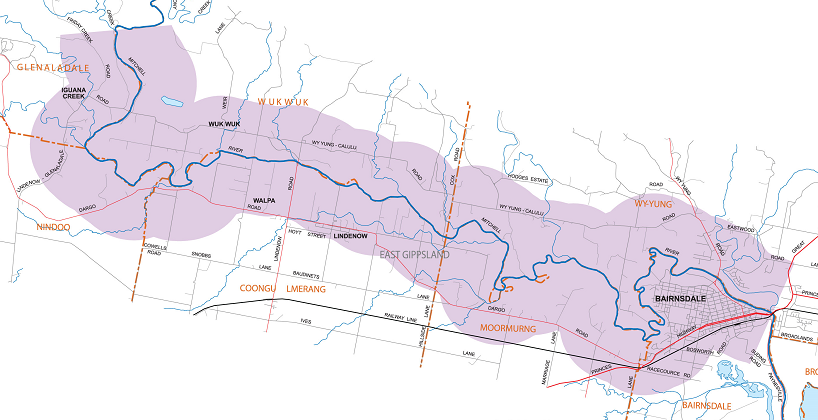Lindenow chemical control area
View larger version of the Lindenow ACCA map ![]() [Image - 892.7 KB]
[Image - 892.7 KB]
Description of the Lindenow Chemical Control Area
The Lindenow Agricultural Chemical Control Area is all that area within the Shire of East Gippsland commencing 2 kilometres on either side of the Mitchell River from its junction with the Raymond Creek at Glenaladale to the Princes Highway Bridge at Bairnsdale.
Chemicals prohibited in this area
By the specified method of application
These chemicals are prohibited to be applied in this area by a specific method.
| Chemical | Prohibited method |
|---|---|
| Aerial spraying or mister application |
| Ester formulations of 2,4-D, 2,4-DB or MCPA | All methods of application |
Unless an ACCA permit has been granted
These chemicals are prohibited to be applied by a specific method without an ACCA permit. An ACCA permit is different to an Agricultural Chemical User Permit (ACUP).
Download the form:
| Chemical | Prohibited method |
|---|---|
| Aerial spraying or mister application |
When the restrictions apply
The restrictions on the use of prohibited chemicals in the Lindenow Agricultural Chemical Control Area apply all year.
Check your products for prohibited chemicals
To determine if a chemical product contains any of these prohibited chemicals:
- read the chemical's label and accompanying information sheet or
- search the Australian Pesticides and Veterinary Medicines Authority (APVMA) PubCRIS database.
Chemicals that are not prohibited for use within an ACCA must be used in accordance with the label directions. Chemical users are reminded to read the product label thoroughly and apply agricultural chemicals responsibly.
What is mister application?
A mister is spraying equipment that uses air for dispersing the spray. It includes:
- mist blowers, orchard sprayers, air blast sprayers, air shear sprayers
- any other spraying equipment that produces a droplet size spectrum that is classified as fine or very fine under ASAE S572 FEB04, Spray Nozzle Classification by Droplet Spectra.
It does not include air assisted boom sprayers or twin fluid nozzle sprayers.
Keep records of chemical use
All users of agricultural and veterinary chemicals, including ACUP holders, are required to keep specified records for all chemical products used within 48 hours of using the chemical product, and to keep these records for a period of two years.
